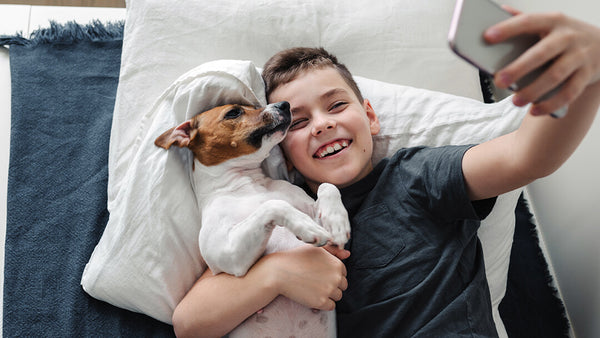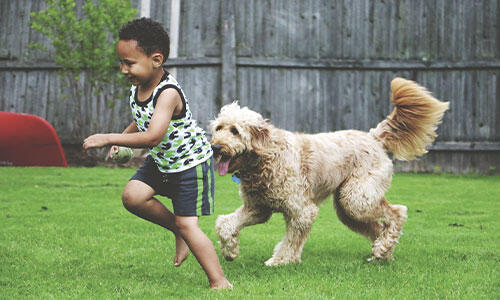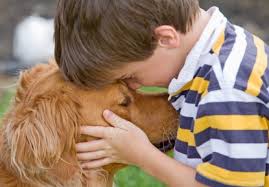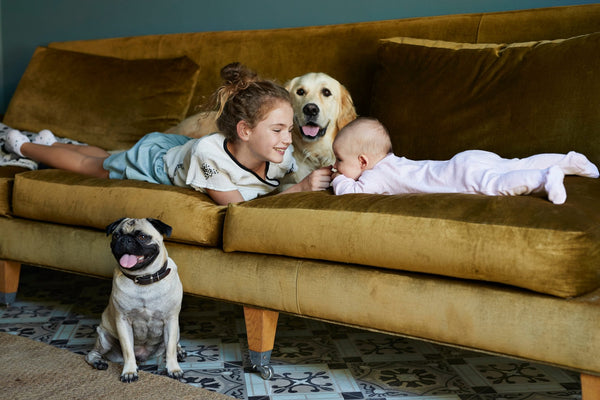Did you know that having a dog around can help manage stress and benefit children immensely? Research has shown that being around a canine companion can have a calming effect on children and help them control stresses in two ways.
First, by increasing levels of oxytocin (the good feeling hormone).
Second, by reducing levels of cortisol (the stress hormone).
I think the two of the best reasons to add a dog to any family, wouldn’t you agree!
But wait there is more!
Every child at some point begs their parents for a puppy. As a parent, we can’t help but think of all the added chores and financial obligations that come with owning a pet. But did you know it can benefit the health and development of your kids?

Overall Benefits Of Kids Growing Up With A Pet Dog
There are so many benefits for children to grow up with a dog and this list could go on and on, but here are just a few:
1. A Life Lesson in Responsibility
Do you want to teach your child the important life lesson of responsibility? Owning a dog is a big responsibility and requires a lot of care and attention. Kids can learn valuable life skills such as feeding, grooming, and exercising the dog.
They can also learn about the importance of routine and consistency in caring for another living being. Taking care of a living being is different than being responsible for unloading the dishwasher. From walking, bathing, feeding, and picking up after (whether that be toys or poop), these are all tasks that your child could do for the household pet.
Companionship: Dogs are loyal and affectionate animals that make great companions for children. They can be a source of comfort and support, especially during times of stress or anxiety. Having a dog around can help children feel less lonely and more connected to their furry friend.
Socialisation: Dogs can help children develop social skills by interacting with other dogs and people in the neighbourhood. Kids can learn how to communicate with the dog, read its body language, and understand its needs. This can help them develop empathy and compassion for other living beings.
Emotional Development: Dogs can have a positive impact on a child's emotional development. They can provide a sense of security, comfort, and even stress relief. Studies have shown that spending time with a dog can reduce stress and anxiety levels in children and promote a sense of calm and relaxation.
Learning: Kids can learn a lot about biology, animal behaviour, and how to communicate non-verbally with dogs. They can also learn about the responsibilities of pet ownership, such as regular vet check-ups, grooming, and training.

2. Kids Who Grow Up with Dogs are Healthier
Immune system: Recent studies in paediatric health have concluded that children who lived with pets (but especially dogs) during their first year of life had a better immune system than those who did not. They believe that exposure to dogs may have positively boosted the maturation of their immune system during infancy. In addition, when they did fall ill, they needed a shorter course of antibiotics compared to the children who did not live with pets.
Allergies: Another study found that children who were predisposed (at least one parent suffers from) respiratory allergies or asthma are much less likely to develop similar issues if they have a dog in the house. They found that early exposure is key. Children who had a dog after the first year of birth had no added health benefits.
Skin: Recent studies found that dogs actually protect children who are at risk for eczema. In fact, children with dog allergies, who did not have dogs in the home, were four times more likely to develop eczema than those who did.
The Centre for Disease Control and Prevention found that children with dogs in the home had reduced anxiety levels and reduced amount of perceived stress. They believe that kids who interact with dogs have increased levels of oxytocin released into their brains. In short, DOGS = HAPPINESS (but you probably already knew that).
3. Better Emotional Intelligence
Growing up with dogs can have a positive impact on a child's emotional intelligence. Emotional intelligence is the ability to identify, understand, and manage one's own emotions and the emotions of others. Here are some ways in which having a dog can help promote emotional intelligence in children:
Empathy: Dogs can help children develop empathy by providing opportunities to practice caring for another living being. Kids can learn to understand the dog's needs, read its body language, and respond appropriately to its emotions.
Self-awareness: Interacting with a dog can help children become more self-aware of their own emotions. They may notice how their own behaviour affects the dog's behaviour and learn to regulate their own emotions to create a positive environment for the dog.
Self-Esteem: Accomplishing small tasks (such as filling up their water dish) will help them feel like they are competent and will also give them a sense of accomplishment.
Social skills: Dogs can help children develop social skills by providing a non-threatening way to practice communication and social interaction. Kids can learn how to communicate with the dog, read its cues, and respond appropriately. This can help them develop similar skills with people.
Stress relief: Spending time with a dog can be a great way to relieve stress and promote emotional well-being. Dogs are known for their ability to provide comfort and emotional support, which can help children feel more relaxed and at ease.
Responsibility: Taking care of a dog can help children develop a sense of responsibility and accountability. Kids can learn about the importance of consistency, routine, and follow-through in caring for another living being.
Caring for another life will require your child to become a more compassionate individual. Feeding or walking them, at times they may have other things they would rather be doing, will mean that they must step outside of themselves, and practice being selfless. A teacher who participated in a study about classroom pets said, “Having pets is an INVALUABLE aid for helping the children gain pride, caring, and empathy for the needs of themselves and others”.
Overall, growing up with a dog can provide children with opportunities to develop emotional intelligence in a safe and supportive environment. By practicing empathy, self-awareness, social skills, stress relief, and responsibility, kids can learn important life skills that will serve them well throughout their lives.

4. More Play and Exercise
Trying to find a creative way to get your kids off the couch and away from their screens? Think about getting a dog! Dogs need daily exercise and taking the dog for a walk or playing with it in the backyard can encourage children to be more active and spend more time outdoors. This can have a positive impact on their physical health and well-being.
On average, children who have a dog in the home exercise an average of 11 minutes more per day than those who do not have a dog. This is through incidental play with the dog, wrestling, chasing, playing tug-o-war. Those minutes may not seem like a lot, but they add up to 5.5 hours a month and 66 hours per year! Some researchers believe that dog ownership may be a viable way to help combat childhood obesity.

5. Pet Therapy
While many different animals have been used in pet therapy, it’s hard to beat man’s best friend. Therapy dogs do a very important job – they can brighten up the day of a child recovering in hospital, comfort someone suffering from anxiety, and give affection and companionship to the elderly or help children and adults in a Learning environment. Therapy dogs have been proven beneficial for children with the following:
Autism: 1 in 150 children in Australia has been diagnosed with autism spectrum disorder (ASD). That is nearly 0.7% of the entire population of children ages 2-17 years of age. Autism Companions have found that therapy dogs have an amazing impact on the quality of life and development of children with ASD. Some of the many benefits include. A dog provides a sense of security, decrease meltdowns, decrease anxiety and acts of aggression, Increased willingness to try new things, Increased ability to face a fearful situation, increases social interaction due to the dog being an ice breaker and taking the focus off the child’s disability, encourages verbal communication, and increased vocabulary.
ADD and ADHD: The most recent study in Australia found that 1 in every 20 children has been diagnosed with ADD or ADHD. Even more concerning, the rate increases almost 2% with every passing year. Some of the benefits of an ADD or ADHD therapy dog include. Dogs help create consistency and a routine, provides an outlet for excess energy to help aid in hyperactivity, dogs help children cope with isolation and depression, they take the stress out of new social situations. All in all, adopting a dog may be one of the best decisions you ever make for your child!

Conclusion: Being A Kid Growing Up With A Dog Can Be Rewarding
Overall, growing up with a dog can be a rewarding and beneficial experience for children, as it can help them develop important life skills and provide them with a loyal and loving companion.
Growing up with a dog can provide children with a sense of companionship, responsibility, exercise, socialisation, emotional development, and learning opportunities. It can be a rewarding and fulfilling experience for both the child and the dog and can help foster a lifelong love and appreciation for animals.
So, what are you waiting for?



